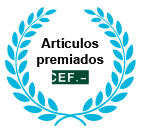The Green marketing of recent Spanish business initiatives: reviewing progress in self-regulation and sustainable organizational commitment
DOI:
https://doi.org/10.51302/marketing.2021.818Keywords:
sustainibility, Green marketing, business strategy, enviromental awards, green reverse logisticsAbstract
Sustainability, as something to be designed by companies in the long term, within and in support of economic development, can be achieved through sustainable marketing by adopting voluntary sustainable production and consumption models. This is intended to achieve the Sustainable Development Goals (SDG) of the United Nations 2030 Agenda. In this research we will see how certain Spanish companies are beginning to adopt an active attitude of responsibility towards the protection of the environment, conservation and reduction of environmental impact towards natural resources in production, as well as products and services, which provide an understanding of local directions regarding the environmental agenda.
For this, the two main perspectives that are analyzed are: company management (European EMAS statistics, European awards and prizes and the place occupied by Spanish companies, Forética and the SG21 standard), as well as product safety or service (eco-labels and supply chain). With this, a way is sought to climb a step towards excellence in management, and through this eco-label also obtain recognition from third parties.
Downloads
References
Altinbasak-Farina, I. y Burnaz, S. (Eds.). (2019). Ethics, Social Responsibility and Sustainability in Marketing. Springer.
Brío, J. A. del y Junquera, B. (2004). Competitividad y Situación Medioambiental de los Centros Productivos Certificados en España. Universia Business Review, 4, 64-77.
Elkington, J. (1994). Towards the Sustainable Corporation: Win-Win-Win Business Strategies for Sustainable Development. California Management Review, 36(2), 90-100.
Fuller, D. A. (1999). Sustainable Marketing: Managerial-Ecological Issues. SAGE Publications.
Galarraga, I. (2002). The use of eco-labels: a review of the literature. European Environment, 12(6), 316-331.
Guillén, N. (2020). La etiqueta ecológica de la Unión Europea: régimen jurídico e implementación. Actualidad Jurídica Ambiental, 98, 44-73.
Guinée, J. B. y Lindeijer, E. (Eds.). (2002). Handbook on life cycle assessment: operational guide to the ISO standards (vol. 7). Springer Science & Business Media.
Hart y Stuart, L. (1995). A Natural-Resource-Based View of the Firm. Academy of Management Review, 20(4).
Harvanová, J. (2018). Selected aspects of integrated environmental management. Annals of Agricultural and Environmental Medicine, 25(3), 403-408.
Hawken, P. (2007). Blessed Unrest. Penguin Group.
Hunt, S. D. (2011). Sustainable marketing, equity, and economic growth: a resource-advantage, economic freedom approach. Journal of the Academy of Marketing Science, 39(1), 7-20.
Jabbour, C. J. C., Neto, A. S., Gobbo, A. J., Ribeiro, A. y Jabbour, A. B. L. (2015). Eco-innovations in more sustainable supply chains for a low-carbon economy: A multiple case study of human critical success factors in Brazilian leading companies. International Journal Production Economics, 164, 245-257.
Krznaric, R. (2020). The good ancestor: how to think long term in a short-term world. Random House.
Kumar, V. (2015). Evolution of marketing as a discipline: What has happened and what to look out for. Journal of Marketing, 79(1), 1-9.
Martin, D. M. y Schouten, J. (2014). Sustainable marketing. Pearson Prentice Hall.
Monfort, E. (2011). ¿Qué papel juegan las baldosas cerámicas en la compra verde y edificación sostenible? Qualicer, Foro del Recubrimiento Cerámico, 12.
Navarro, V. G. y Revilla, G. G. (2020). La incorporación de los objetivos de desarrollo sostenible como factor de competitividad empresarial. Información Comercial Española, ICE: Revista de economía, 912, 75-86.
Rivera, J. (2007). Re-evaluating Green Marketing Strategy: a Stakeholder Perspective. European Journal of Marketing, 451(11/12), 1.328-1.358.
Rodríguez, M. (29 de diciembre de 2020). Qué es el «pensamiento catedral», una de las grandes lecciones de 2020 según el filósofo Roman Krznaric. BBC News Mundo. https://www.bbc.com/mundo/noticias-55448362
Simchi-Levi, D., Simchi-Levi, E. y Kaminsky, P. (1999). Designing and managing the supply chain: Concepts, strategies, and cases. McGraw-Hill.
Valle, S. S. del (2010). Gestión estratégica: clave para la responsabilidad social de las empresas. Dimensión Empresarial, 8(2), 24-37.
Van Dam, Y. K. y Apeldoorn, P. A. (1996). Sustainable marketing. Journal of Macromarketing, 16(2), 45-56.
WCED, S. W. S. (1987). World commission on environment and development. Our common future, 17(1), 1-91.
Yilmazer, M. y Onay, M. (2019). Dynamics of Sustainable Entrepreneurship: A Proposed 4S Model. En Ethics, Social Responsibility and Sustainability in Marketing (pp. 237-261). Springer.
Downloads
Published
How to Cite
Issue
Section
License
Copyright (c) 2022 María Angeles Casabó-Ortí

This work is licensed under a Creative Commons Attribution-NonCommercial-NoDerivatives 4.0 International License.





















